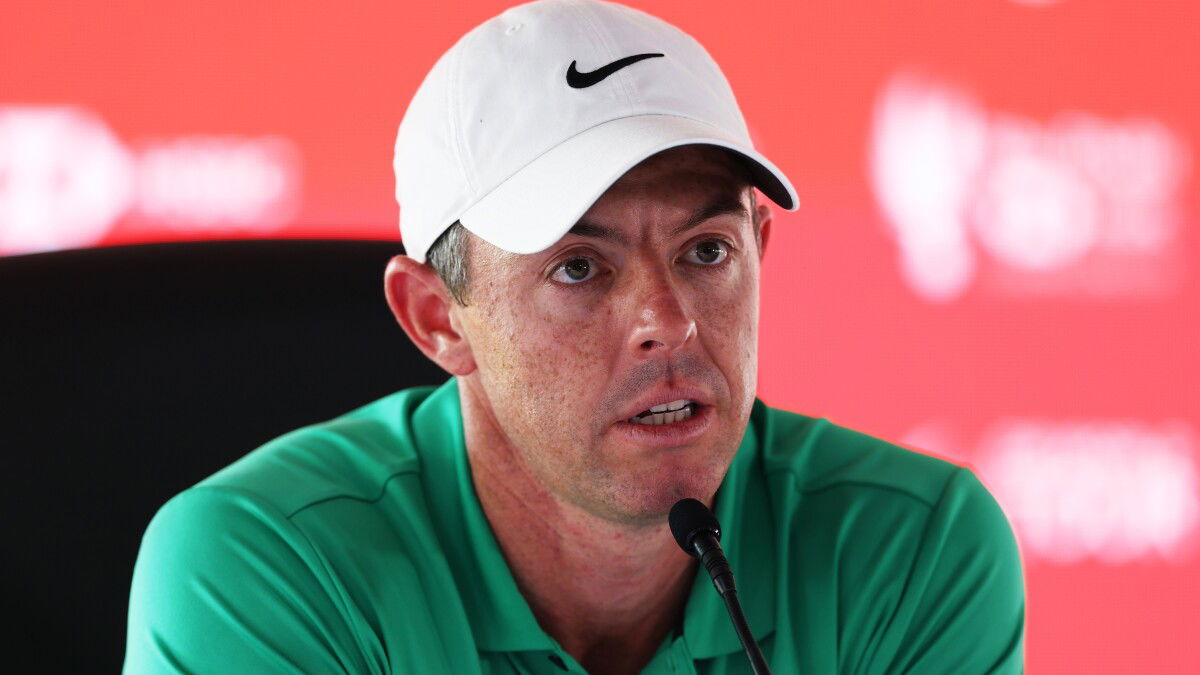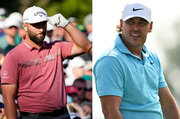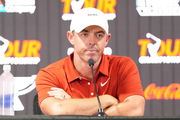
Getty
ABU DHABI, UNITED ARAB EMIRATES – NOVEMBER 06: Rory McIlroy of Northern Ireland speaks in a press conference following the Pro-Am prior to the Abu Dhabi HSBC Championship 2024 at Yas Links Golf Course on November 06, 2024 in Abu Dhabi, United Arab Emirates. (Photo by Richard Heathcote/Getty Images)

Getty
ABU DHABI, UNITED ARAB EMIRATES – NOVEMBER 06: Rory McIlroy of Northern Ireland speaks in a press conference following the Pro-Am prior to the Abu Dhabi HSBC Championship 2024 at Yas Links Golf Course on November 06, 2024 in Abu Dhabi, United Arab Emirates. (Photo by Richard Heathcote/Getty Images)
For a moment at Oakmont, it felt like 2011 all over again. Rory McIlroy torched one of golf’s toughest venues with a jaw-dropping 62 in the third round of the 2025 U.S. Open. He was in full flight—driving it miles, flushing irons, and rolling in putts like a man possessed. It was vintage Rory, echoing that record-setting performance at Congressional in 2011 when, at just 22, he romped to his first major title by eight shots. But as quickly as he walked off the 18th green at the 2025 U.S. Open, the magic gave way to a strange silence. No press conference. No flash interview. Not even a word for TV. McIlroy, once the most articulate and accessible superstar in the sport, ghosted the media for the sixth straight round in a major.
Watch What’s Trending Now!
“In my view, Rory has been the best with the media over the last 15 years,” Brandel Chamblee wrote in a pointed post on X, “which makes his refusal to talk after his rounds at the last two majors so puzzling.” Chamblee, a former PGA Tour winner and Golf Channel analyst, wasn’t just questioning McIlroy’s recent behavior — he was warning of its consequences. He reminded fans that Tiger Woods, even after crushing defeats, almost always spoke. “Perhaps it’s out of a sense of duty,” Chamblee wrote, “following a custom passed down to them by the players that came before them who understood that the debt you pay to those who elevated the game before you is by elevating the game for those who come after you.”
In my view, Rory has been the best with the media over the last 15 years, which makes his refusal to talk after his rounds at the last two majors so puzzling. I think he is lithe enough to understand this is a bad long term strategy. Fans are fickle. They are incredibly generous… https://t.co/HwxZWAlbrO
— Brandel Chamblee (@chambleebrandel) June 14, 2025
ADVERTISEMENT
McIlroy has long been seen as a torchbearer for the sport, for the fans, for the next generation. That’s what makes this shift so jarring. Just two months ago, he dramatically won the Masters, completing the career Grand Slam and cementing his place in golf history. It was a moment built for celebration—and for Rory, usually one to embrace the spotlight, it should’ve been. Instead, what followed was an uncharacteristic retreat. After his Masters triumph, McIlroy all but disappeared from the media landscape. At the PGA Championship, he declined all post-round interviews. His only public comment came days later, when he briefly addressed his non-conforming driver, saying he wanted to avoid speaking out in frustration.
At the U.S. Open, that silence continued. After every round at Oakmont, McIlroy passed by reporters without a word. For a player known as one of the sport’s most thoughtful voices, the absence has been striking. As Chamblee noted, fans are loyal, but also fickle. When a player who has always been generous with his time suddenly stops speaking, it sends a message, one that might reverberate beyond this tournament. And McIlroy’s media silence isn’t the only controversy trailing him at Oakmont—his emotions have been flaring on the course, too, drawing just as much attention as his scorecard.
Top Stories
After Brooks Koepka, Another Pro Cuts All Ties With LIV Golf & Publicly Backs PGA Tour

Amanda Balionis Confirms New Relationship Ending Months of Rumors

Charley Hull Shares Crucial Health Update 28 Days Before 2026 LPGA Season Begins

Jon Rahm Receives Fresh Warning After Brooks Koepka Quit LIV Golf Abruptly: ‘In the Worst Spot’

Rory McIlroy Gets Denied Major Honor After Tax Officials Allegedly Brought Concerning Reports to Light

ADVERTISEMENT
Frustration on display: McIlroy’s club-smashing moment at U.S. Open
That frustration hasn’t just been verbal—or rather, the lack thereof. On Friday at Oakmont, after an errant tee shot on the par-4 12th, McIlroy hurled his iron in frustration. Then came the scene on the brutal 17th: following another misfire, he slammed a club into the turf with such force it snapped and damaged the tee marker—all caught on the broadcast and quickly dissected online. Fans and pundits had mixed reactions. Some chalked it up to passion. Others weren’t so forgiving, labeling the outburst “immature” and “unprofessional,” especially for a player of McIlroy’s stature. The moment felt out of step with the usually composed, thoughtful competitor who has built a career as much on his demeanor as his talent.
Rory McIlroy is still one of the most captivating players in the game. His talent remains generational, his résumé historic. But the burden of leadership in golf doesn’t stop at the edge of the green. With Chamblee’s words echoing and his silence becoming more conspicuous, McIlroy now faces a challenge that goes beyond club selection or putt speed: reconnecting with the people who’ve walked every step of this journey with him.
ADVERTISEMENT
ADVERTISEMENT
ADVERTISEMENT
ADVERTISEMENT

